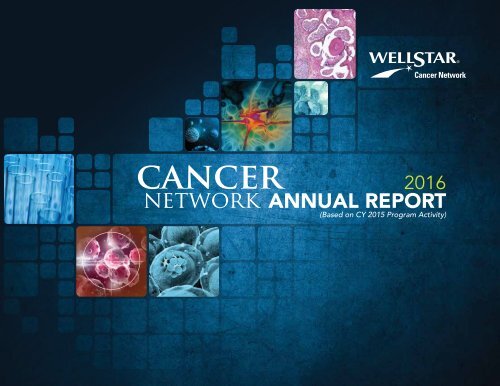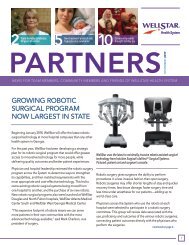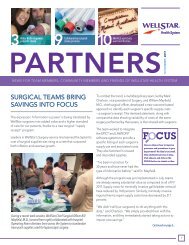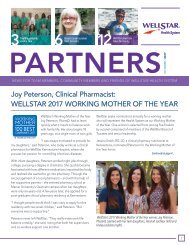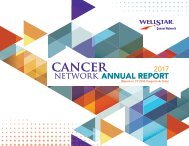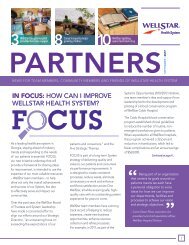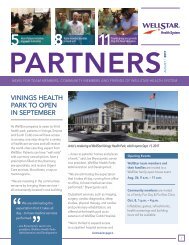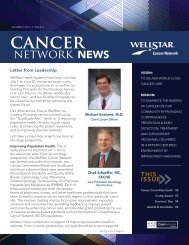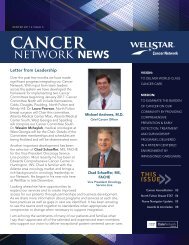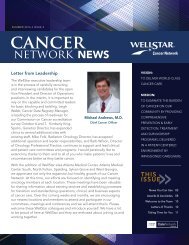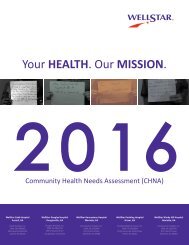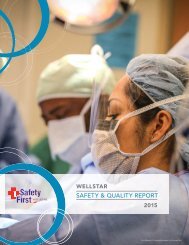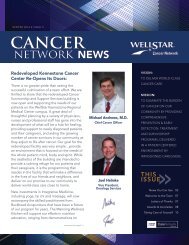WellStar Cancer Network 2016 Annual Report
Create successful ePaper yourself
Turn your PDF publications into a flip-book with our unique Google optimized e-Paper software.
WELLSTAR CANCER NETWORK • <strong>2016</strong> ANNUAL REPORT • #
<strong>2016</strong> <strong>Cancer</strong> <strong>Annual</strong> <strong>Report</strong><br />
(Based on CY 2015 Program Activity)<br />
Welcome to the <strong>WellStar</strong> <strong>Cancer</strong> <strong>Network</strong> <strong>2016</strong> <strong>Annual</strong><br />
<strong>Report</strong> based on 2015 program activities. 2015 was a year<br />
of transformative growth throughout our health system, and a<br />
year in which our hard work yielded the most important kind of<br />
results: improved outcomes and improvements in our patients’<br />
quality of life.<br />
During this year we saw the results of an $11 million redesign<br />
of our <strong>Cancer</strong> Center at <strong>WellStar</strong> Kennestone Hospital and<br />
opened the doors to several new facilities that together will<br />
propel <strong>WellStar</strong> into a top-tier national cancer program. These<br />
include our new state-of the-art 6,600 square-foot outpatient<br />
infusion center, the Center for Survivorship and Support, and a<br />
Patient Resource Center unlike any other in the United States.<br />
All of these improvements were developed with a singular<br />
focus on the patient experience.<br />
Medicine at <strong>WellStar</strong> also achieved top tier results. Our<br />
multidisciplinary STAT Clinics drastically reduced the number<br />
of days from initial diagnosis to initial treatment for certain<br />
cancers – resulting in less time spent worrying and waiting,<br />
and more time treating cancer. Our commitment to increased<br />
lung cancer screening saw a major shift in identifying lung<br />
cancers at earlier, more treatable, stages than ever before.<br />
Our expanded <strong>Cancer</strong> Genetics program had its busiest year<br />
ever in 2015, and is projected to see even more patients in <strong>2016</strong>.<br />
In addition to expanded medical options and major capital<br />
improvements, <strong>WellStar</strong> maintained its leading role in bringing<br />
national resources to our community setting. We are still the only<br />
hospital system in Georgia to partner with Accuray to offer the<br />
company’s CyberKnife ® and TomoTherapy ® platforms. These<br />
state-of-the-art technologies let us treat difficult and otherwise<br />
untreatable cancers with superior precision and reduced treatment<br />
time. We also continue to be the only health system in Metro<br />
Atlanta to participate in the Mayo Clinic Care <strong>Network</strong>, through<br />
which <strong>WellStar</strong> clinicians can consult with Mayo Clinic Care<br />
<strong>Network</strong> experts on complex cases at no cost to our patients.<br />
<strong>WellStar</strong> believes that collaboration with other leading<br />
organizations is essential to achieving the best patient outcomes.<br />
In 2015, we launched a first-in-the-nation partnership with the<br />
American <strong>Cancer</strong> Society to provide a new resource center where<br />
patients and family members can learn about their diagnosis<br />
and treatment options. Right next door, specially trained nurse<br />
navigators can offer guidance to those seeking information from<br />
our abundant in-house and online libraries.<br />
Advances in treatment, technology and infrastructure are<br />
important pieces in <strong>WellStar</strong>’s ultimate goal: healing people.<br />
But the most essential element is our people. We deliver<br />
exceptional cancer care because <strong>WellStar</strong> is the sum of our<br />
physicians, nurses, administrators, managers, therapists,<br />
other professionals and volunteers who work collaboratively<br />
to ensure that our patients are given the best chance at a<br />
good long-term outcome.<br />
Across <strong>WellStar</strong>’s campuses, oncologists, surgeons, radiation<br />
oncologists, infusion specialists, nurses and counselors treat<br />
more than 3,500 new cancer cases each year. In addition to the<br />
latest technologies, access to clinical trials and expert physicians,<br />
patients also can learn about the best nutrition strategies, receive<br />
spiritual support, and manage the physical side effects of cancer<br />
treatment. We treat people from diagnosis through survivorship,<br />
offering an environment unlike any other.<br />
As much as we are honored by the distinction, we were not<br />
surprised when our cancer program was recognized recently as<br />
2 • WELLSTAR CANCER NETWORK • <strong>2016</strong> ANNUAL REPORT
one of the top programs in the country on Becker’s Hospital<br />
Review’s “100 Hospitals and Health Systems with Great<br />
Oncology Programs.” With our major infrastructure upgrades,<br />
innovative holistic services, and the strength and expertise of<br />
our professional team, we anticipate many more such honors in<br />
the years to come.<br />
In 2015, we made great strides toward our goal of achieving<br />
the best of both worlds: world-class cancer care in a community<br />
setting. Thank you for your ongoing support of the <strong>WellStar</strong><br />
<strong>Cancer</strong> <strong>Network</strong>.<br />
Respectfully,<br />
Michael B. Andrews, M.D.<br />
Chief <strong>Cancer</strong> Officer<br />
David L. Parks, M.D.<br />
<strong>Cancer</strong> Committee Chairman<br />
WELLSTAR CANCER NETWORK • <strong>2016</strong> ANNUAL REPORT • 3
Investments in <strong>Cancer</strong><br />
“It is wonderful how much may be done, if we are always doing.” - Thomas Jefferson<br />
IIt takes an extraordinary effort to achieve<br />
an extraordinary outcome. <strong>WellStar</strong> provides<br />
cancer care that extends beyond medicine.<br />
We treat the psychosocial, spiritual and<br />
ancillary physical needs that frequently<br />
attend cancer, and deliver care in the most<br />
efficient manner possible, reducing wait<br />
times and consolidating services wherever<br />
possible. With this in mind, we have<br />
developed a range of programs and services<br />
that address the needs of Mind, Body and<br />
Spirit for patients currently in treatment and<br />
those who have completed treatment.<br />
In 2015, we saw the culmination of years<br />
of effort and an $11 million investment<br />
when we opened the doors to a dedicated<br />
center for these programs and services at<br />
our Kennestone Campus: the new Center<br />
For Survivorship and Support. This center<br />
is a hub for healing - providing support to<br />
patients and their caregivers - and aiding<br />
the growing number of cancer survivors<br />
in our community as they adjust to life<br />
after cancer treatment. These services are<br />
provided in an atmosphere emphasizing<br />
dignity, respect and collaborative decision<br />
making.<br />
Individual program and service offerings are<br />
constantly evolving, and our commitment to<br />
patient and family-centered care will only<br />
grow in coming years.<br />
Offerings that address the needs<br />
of the mind include:<br />
• Parks Resource Library<br />
• Mindfulness-based stress<br />
reduction sessions<br />
Offerings that address the needs<br />
of the body include:<br />
• Manning Wellness Kitchen - a new<br />
state-of-the-art demonstration kitchen<br />
for nutritional education<br />
• Wellness Shoppe offering wig and<br />
accessory options for those experiencing<br />
hair loss<br />
• Bra and mastectomy prosthesis services<br />
• Yoga, tai chi and acupuncture<br />
for fitness and stress relief<br />
Offerings that address the needs<br />
of the spirit include:<br />
• Gray Chapel - a tranquil chapel where<br />
patients and their families can seek<br />
and renew their spiritual strength.<br />
Chaplains provide meditation services<br />
here twice each week.<br />
• Newly renovated Garden of Courage –<br />
a space for peaceful reflection and<br />
joyous celebration when patients<br />
triumphantly ring the bell upon<br />
completion of their final treatment.<br />
(Clockwise) Manning Wellness Kitchen;<br />
Wellness Shoppe; Parks Resource Library;<br />
Rick Gray Family Chapel<br />
4 • WELLSTAR CANCER NETWORK • <strong>2016</strong> ANNUAL REPORT
IMPROVING ACCESS<br />
<strong>Cancer</strong> is complex, and although there has<br />
never been more knowledge about it than<br />
the present, learning and making decisions<br />
about a disease with which you or a loved<br />
one has recently been diagnosed can be<br />
quite overwhelming. Information about a<br />
specific disease or course of treatment can<br />
be hard to find. In 2015, <strong>WellStar</strong> addressed<br />
this challenge in several ways. Most visible<br />
among our efforts to improve access to care<br />
and information was the <strong>WellStar</strong> <strong>Cancer</strong><br />
Connect Line, a one-stop phone line where<br />
patients can learn about <strong>WellStar</strong> <strong>Cancer</strong><br />
<strong>Network</strong> services and be connected directly<br />
to a nurse navigator to plan next steps.<br />
CENTER FOR GENETICS AND<br />
INDIVIDUALIZED MEDICINE<br />
<strong>WellStar</strong>’s commitment to improving<br />
access to information about cancer<br />
includes information about individual risk<br />
for hereditary cancers. Between five and<br />
ten percent of all cancers are diagnosed<br />
in people with an inherited predisposition<br />
toward increased risk. Through <strong>WellStar</strong>’s<br />
Genetic Risk Assessment, when possible,<br />
we strike at cancer before it appears.<br />
Our patients first meet<br />
with a genetic counselor<br />
to determine whether<br />
and which genetic<br />
testing is appropriate.<br />
If it is, the patient will<br />
receive genetic testing<br />
for the specific hereditary conditions that<br />
are known to increase the risk of various<br />
cancers. We then recommend specific<br />
courses of action based on the results,<br />
ranging from increased screenings to<br />
lifestyle changes, all the way to prophylactic<br />
medication and procedures. Each patient<br />
receives an individualized plan giving him<br />
or her the best chance for prevention and<br />
early detection.<br />
Having this knowledge contributes to<br />
smart and effective decisions about early<br />
detection, risk reduction and treatment if<br />
it is needed. All of these are essential to<br />
achieving the best outcome. While <strong>WellStar</strong><br />
already operates the highest volume cancer<br />
genetics program in the state of Georgia, in<br />
2015 we greatly increased the availability of<br />
genetic counseling and testing as part of our<br />
comprehensive cancer care.<br />
This year <strong>WellStar</strong> opened the new Center<br />
for Genetics and Individualized Medicine as<br />
part of the newly renovated <strong>Cancer</strong> Center<br />
at Kennestone Hospital. The space was<br />
built to support the growth of our genetics<br />
program and enhance the experience of our<br />
genetic counseling patients. An additional<br />
genetic counselor position was added in<br />
2015, allowing the already bustling program<br />
to have its busiest year ever. In fiscal year<br />
<strong>2016</strong>, the program will see 44% more<br />
patients than the prior year, for a total of<br />
over 3,000 patients served.<br />
The Center for Genetics and Individualized<br />
Medicine includes four custom-designed<br />
consultation rooms which include video<br />
monitors that allow patients an innovative<br />
way to view their family history and review<br />
complicated data and testing options with<br />
our genetic counselors. The center has an<br />
in-house lab to ensure quick and efficient<br />
collection of patient specimens during their<br />
appointments. Additional staff has also been<br />
added to support the increased number of<br />
patients seen.<br />
WELLSTAR CANCER NETWORK • <strong>2016</strong> ANNUAL REPORT • 5
Technology<br />
CYBERKNIFE ®<br />
A pain-free, non-surgical option for patients<br />
with inoperable or surgically complex tumors.<br />
<strong>WellStar</strong> is home to Georgia’s first<br />
CyberKnife Robotic Radiosurgery System.<br />
This state-of-the-art treatment allows the<br />
physician to deliver an intense amount of<br />
radiation at the exact site of the tumor while<br />
reducing the negative impact on surrounding<br />
healthy tissue.<br />
During treatment, multiple beams of highenergy<br />
radiation converge precisely at the<br />
targeted point of treatment, usually a tumor<br />
or lesion inside the body. CyberKnife is<br />
composed of a linear accelerator (or Linac),<br />
which is mounted on a robotic arm and<br />
utilizes a revolutionary image guidance<br />
system. The flexibility of the robotic arm<br />
allows CyberKnife to deliver radiation<br />
to tumors anywhere in the body without<br />
incisions or scarring, and with minimal side<br />
effects. The advanced imaging tracks tumors<br />
and patient movement and will adjust the<br />
beams of high-dose radiation to ensure<br />
treatment is delivered with a high degree<br />
of accuracy. This eliminates the need for<br />
patients to have stabilizing head frames or<br />
limit their breathing during treatment to<br />
minimize movement of the tumor.<br />
In 2015, Mark McLaughlin, M.D., with other<br />
<strong>WellStar</strong> radiation oncologists, performed<br />
955 treatments, making <strong>WellStar</strong> one of the<br />
most active CyberKnife centers in the U.S.<br />
2015 CyberKnife Treatment Sites<br />
Brain: 92, Lung: 91, Spine: 24, Benign: 20, Head & Neck: 9, Prostate: 8, Bone: 6,<br />
GYN: 5, Liver: 4, Rectal: 4, Abdomen: 3, Adrenal: 3, Breast: 1, Kidney: 1, Skin: 1<br />
Breast-0%<br />
Skin-0%<br />
Bone-2%<br />
Head & Neck-3%<br />
Benign-7%<br />
Spine-9%<br />
Adrenal-1%<br />
Liver-2%<br />
Kidney-0%<br />
Abdomen-1%<br />
GYN-2%<br />
Rectal-2%<br />
Prostate-3%<br />
Lung-34%<br />
Brain-34%<br />
6 • WELLSTAR CANCER NETWORK • <strong>2016</strong> ANNUAL REPORT
2015 TomoTherapy Treatment Sites<br />
(2,811 total treatments)<br />
Prostate: 33, Head & Neck: 19, Brain: 12, GYN: 12, Lung: 8, Bone: 6,<br />
Breast: 5, Rectal: 5, Esophagus: 3, Pancreas: 1, Skin: 1, Stomach: 1<br />
Stomach-1%<br />
Skin-1% Pancreas-1%<br />
Breast-5%<br />
Esophagus-3%<br />
Brain-12%<br />
Prostate-33%<br />
Lung-8%<br />
GYN-12%<br />
Head & Neck<br />
-19%<br />
Anal/<br />
Rectum-5%<br />
TOMOTHERAPY ®<br />
A pain-free, customized radiation therapy<br />
system based on individual patient anatomy.<br />
<strong>WellStar</strong> is one of the first hospitals in<br />
Georgia to offer this revolutionary therapy<br />
and the first to offer patients both CyberKnife<br />
and TomoTherapy radiation options.<br />
TomoTherapy combines an advanced form of<br />
intensity modulated radiation therapy (IMRT),<br />
with the accuracy of CT scanning, in a single<br />
machine. This personalized treatment system<br />
is designed to revolve 360 degrees around<br />
the patient while taking a CT scan before<br />
each treatment, verifying the exact position<br />
of the tumor and, if necessary, adjust the<br />
beams to ensure precise dosage to the<br />
tumor. This allows treatment to be delivered<br />
continuously to the tumor from every angle.<br />
More beam directions give physicians more<br />
control in treatment planning, which reduces<br />
the risk of short- and long-term side effects.<br />
WELLSTAR CANCER NETWORK • <strong>2016</strong> ANNUAL REPORT • 7
BRACHYTHERAPY:<br />
HDR (High-Dose Radiation)<br />
or LDR (Low-Dose Radiation)<br />
An internal radiotherapy delivered in a short<br />
treatment period allowing patients to get<br />
back to their everyday life sooner.<br />
<strong>WellStar</strong> is home to the first Elekta Flexitron ®<br />
HDR unit in the U.S. and is a reference<br />
training site to share best practices with other<br />
radiation centers. Brachytherapy is a type<br />
of radiotherapy that places the radioactive<br />
seeds or source in, or at, the tumor site.<br />
This approach allows a precise treatment<br />
to the tumor while reducing the risk of<br />
damage to healthy tissue and organs close<br />
by. Brachytherapy can be administered as a<br />
primary treatment course or in combination<br />
with other treatment methods, such as<br />
surgery or traditional radiotherapy.<br />
The HDR approach delivers the dose by a<br />
radioactive source that is placed temporarily<br />
in or close to the tumor and removed after<br />
a few minutes. This treatment method is<br />
minimally invasive and can be delivered over<br />
one to 10 treatments.<br />
The LDR approach is permanent by placing<br />
tiny radioactive seeds directly into the tumor.<br />
The seeds deliver low doses of radiation over<br />
a few months, killing the cancer cells.<br />
In 2015, <strong>WellStar</strong> delivered 885 HDR<br />
Brachytherapy treatments with seven<br />
patients having LDR Brachytherapy with<br />
447 radioactive seeds implanted.<br />
2015 HDR Treatment Sites<br />
Breast: 71, GYN: 41, Skin: 3, Lung: 3, Esophagus:1<br />
Lung-3%<br />
Esophagus-1%<br />
GYN-34%<br />
Breast-60%<br />
Skin-2%<br />
PRECISION MEDICINE:<br />
<strong>Cancer</strong> therapy is always evolving. Physicians<br />
at <strong>WellStar</strong> have been closely involved<br />
with this ongoing progress through clinical<br />
research trials testing many of the drugs that<br />
subsequently have become FDA approved.<br />
At <strong>WellStar</strong> we use a precision approach<br />
to treating localized cancers, employing<br />
state-of-the-art surgeries and radiation<br />
therapy including IMRT, CyberKnife and<br />
TomoTherapy. <strong>Cancer</strong> throughout the body is<br />
treated with chemotherapy, cell signaling pills,<br />
immune-based therapies and genetic-based<br />
therapies. Often, it can be helpful to obtain a<br />
tissue sample and perform genetic profiling,<br />
which allows the identification of cancers with<br />
targetable mutations. A number of cancer<br />
pills have been created that target specific<br />
genetic mutations, enabling high response<br />
rates and improved symptoms. Some genetic<br />
driver mutations we treat include EGFR,<br />
ALK, ROS1, BRAF, MET, HER2, RET. In many<br />
instances, response rates are so high that<br />
genetic-based therapies have moved ahead<br />
of chemotherapy as the first line of treatment.<br />
8 • WELLSTAR CANCER NETWORK • <strong>2016</strong> ANNUAL REPORT
A PATIENT’S STORY<br />
The Genetic Risk Assessment program has<br />
produced many success stories, including<br />
among our own team members. Desiree<br />
Meeks, RN is a perioperative charge nurse<br />
who has worked for <strong>WellStar</strong> for the last ten<br />
years. As she says, “<strong>Cancer</strong> diagnoses are as<br />
common in my family as cuts and scrapes are<br />
in other families.”<br />
Over the years, her aunts, cousins and<br />
other relatives have been diagnosed with<br />
ovarian, colorectal and endometrial cancer;<br />
and she was instrumental in recognizing her<br />
own mother's cancer. “When I was a recent<br />
nursing school graduate and my mother<br />
was 48, I noticed unusual behaviors and<br />
symptoms in her,” said Ms. Meeks. “She went<br />
to a doctor at my urging and was diagnosed<br />
with endometrial cancer.”<br />
One of her aunts, who had already had<br />
multiple primary cancers, sought genetic<br />
testing in order to serve as a sort of baseline<br />
for the family. The results have helped others<br />
in the family become more aware of their risk.<br />
Desiree herself had experienced reproductive<br />
health issues throughout her adult life,<br />
and her doctors thought she might never<br />
be able to have children. She beat the<br />
odds, becoming a mother of two. After her<br />
daughters were born, her doctors urged her<br />
to have a hysterectomy in order to address<br />
many of her medical challenges. She resisted,<br />
because at only 34 years old, she wanted<br />
to avoid very early, surgically-induced,<br />
menopause. She began to research options<br />
in the hopes of keeping her ovaries.<br />
Following the example of her aunt, Desiree<br />
sought genetic testing. She hoped it might<br />
reveal that she didn't have an increased<br />
risk of ovarian cancer. Instead the results<br />
showed that she had Lynch Syndrome, a<br />
hereditary condition that causes increased<br />
risk for many types of cancer, especially<br />
ovarian, endometrial and colorectal. Rather<br />
than providing a rationale for keeping her<br />
ovaries, genetic testing empowered her<br />
with the resolve she needed to undergo the<br />
hysterectomy.<br />
By opting for the surgery, Desiree eliminated<br />
her chance of getting endometrial and<br />
cervical cancer, and dramatically reduced<br />
her risk for ovarian cancer. Because cancer is<br />
so prevalent in her family, she remembers,<br />
“being afraid that the surgeon would<br />
find a malignancy while performing the<br />
hysterectomy.” She remains vigilant about<br />
early detection for the gastrointestinal<br />
cancers for which she remains at high risk.<br />
Knowing she has Lynch Syndrome has<br />
changed the way she talks about health with<br />
her family. She urged her sister to be tested,<br />
and she intends to have her daughters tested<br />
when they are old enough. She knows that<br />
they each have a 50-50 chance of carrying<br />
the gene for Lynch Syndrome.<br />
Because of her experience, Desiree provides<br />
cancer patients empathy and a level of social<br />
support that makes a lasting impact. “I have<br />
been on both sides of the equation, so I<br />
can speak to my patients as an expert and<br />
as someone who has been where they are.<br />
It helps them feel more at ease when they<br />
see that <strong>WellStar</strong> offers a way to gain some<br />
measure of control over their cancer risk.”<br />
WELLSTAR CANCER NETWORK • <strong>2016</strong> ANNUAL REPORT • 9
Breast <strong>Cancer</strong> Program<br />
PROGRAMMATIC<br />
VIEW<br />
In the following pages we will share<br />
updates about our key oncological<br />
practice areas, including highlights<br />
from 2015, success metrics, and a<br />
preview of <strong>2016</strong> expectations.<br />
• Breast Program<br />
• Gastrointestinal (GI) Program<br />
• Genitourinary (GU) Program<br />
• Thoracic Program<br />
• GYN Program<br />
• Survivorship and Support<br />
Breast cancer is the second leading cause of<br />
cancer-related death in women, and the most<br />
prevalent in terms of widespread awareness.<br />
The <strong>WellStar</strong> <strong>Cancer</strong> <strong>Network</strong> breast cancer<br />
program is a model in multi-disciplinary<br />
success, offering:<br />
• Dedicated breast surgeons, who practice<br />
state-of-the-art care including less-invasive<br />
surgery. Our breast surgeons performed<br />
603 breast surgeries at <strong>WellStar</strong> facilities<br />
in 2015.<br />
• Medical oncologists who provide access<br />
to advances through chemotherapy, and<br />
when appropriate, clinical trials. Radiation<br />
oncologists offering the latest in treatment<br />
options including accelerated partial breast<br />
irradiation (APBI)– which allows patients to<br />
complete their treatment in five days, versus<br />
the traditional five-to-six week regimen.<br />
• Cutting-edge digital imaging, including<br />
dedicated breast MRI and the ability to<br />
perform minimally invasive image-guided<br />
breast biopsies.<br />
• A comprehensive support network for<br />
cancer patients and their families that<br />
includes counseling, cosmetic support for<br />
the side effects of treatment, lymphedema<br />
prevention and management, and exercise<br />
programs designed for better health.<br />
• The most active cancer genetic counseling<br />
program in Georgia.<br />
• Tumor conferences: A treatment planning<br />
approach in which a number of doctors<br />
from different specialties review and discuss<br />
a patient's condition and treatment options.<br />
More than 25% of breast cancer cases<br />
diagnosed at <strong>WellStar</strong> are evaluated by a<br />
tumor conference.<br />
Multiple studies have demonstrated similar accuracy of needle biopsy as open surgical biopsy<br />
in the diagnosis of breast lesions, with lower complication rates. Furthermore, women with<br />
breast cancer diagnosed by needle biopsy are more likely to be treated with a single surgical<br />
procedure, even after excluding the initial surgical biopsy procedure. This decreases morbidity<br />
and increases cost effectiveness and patient satisfaction. In CY 2015, 100% of breast cancer<br />
patients treated at <strong>WellStar</strong> had a needle biopsy prior to surgical intervention.<br />
Source: National Quality Forum<br />
10 • WELLSTAR CANCER NETWORK • <strong>2016</strong> ANNUAL REPORT
Despite evidence suggesting the role of<br />
adjuvant endocrine therapy in lowering<br />
the risk of tumor recurrence, many female<br />
patients who should be receiving this<br />
therapy are not. This measure assesses<br />
whether patients with a certain stage of<br />
breast cancer (IC through IIIC) and ER/PR+<br />
are currently receiving the therapy. There<br />
are allowable medical, patient and system<br />
reasons to document instances in which a<br />
woman with stage IC through IIIC, ER/PR+<br />
may not be a candidate for the therapy.<br />
Source: National Quality Forum<br />
100<br />
80<br />
60<br />
40<br />
20<br />
Hormone Therapy for Hormone<br />
Receptor Positive Breast <strong>Cancer</strong><br />
0<br />
93%<br />
<strong>WellStar</strong><br />
90%<br />
Benchmark<br />
Benchmark: NCBC , CP3R Expected Performance<br />
Hillary Hahm, M.D., Ph.D.<br />
Breast Sub Committee Chair<br />
100<br />
80<br />
60<br />
40<br />
20<br />
0<br />
Combination Chemotherapy<br />
for Hormone Receptor<br />
Negative Breast <strong>Cancer</strong><br />
100%<br />
<strong>WellStar</strong><br />
90%<br />
Benchmark<br />
Benchmark: CP3R Expected Performance<br />
There is extensive documentation of the<br />
benefit of multi-agent chemotherapy in<br />
women with hormone receptor negative<br />
breast cancer. Chemotherapy reduces<br />
the risk of distant disease recurrence and<br />
death by about one-third. The restriction<br />
to women under age 70 is because<br />
this measure is for the purpose of<br />
provider accountability. There are limited<br />
data in women over age 70 to guide<br />
recommendations, and a higher fraction<br />
of these women have reasons to omit<br />
chemotherapy, including co-morbidity.<br />
Source: National Quality Forum<br />
Lisa Sherman, BSN, RN<br />
Breast Nurse Navigator<br />
Sara Owens, BSN, RN<br />
Breast Nurse Navigator<br />
WELLSTAR CANCER NETWORK • <strong>2016</strong> ANNUAL REPORT • 11
Breast Conservation Surgery Rate<br />
100<br />
80<br />
60<br />
70%<br />
40<br />
53%<br />
20<br />
0<br />
<strong>WellStar</strong> Benchmark<br />
Benchmark: NAPBC<br />
Based on multiple prospective<br />
randomized trials from both the<br />
United States and Europe which<br />
have demonstrated equivalent<br />
results as measured by overall<br />
patient survival, consensus exists<br />
that breast conservation treatment<br />
is an appropriate method of primary<br />
therapy for the majority of women<br />
with Stage I and II breast cancer and is<br />
preferable because it provides survival<br />
rates equivalent to those of total<br />
mastectomy and axillary dissection<br />
while preserving the breast. Additional<br />
trials have also determined that breast<br />
conservation treatment is a reasonable<br />
approach and is generally applicable<br />
for most women with Stage 0 breast<br />
cancer (ductal carcinoma in situ or<br />
DCIS). However, not all patients are<br />
appropriate candidates for, or select,<br />
breast conservation treatment. The<br />
rate of breast conservation surgery<br />
will vary significantly based on patient<br />
age, stage of disease, as well as other<br />
factors, and therefore will also vary<br />
between institutions based on case<br />
mix. No ideal or expected rate of<br />
breast conservation treatment has been<br />
established, or is implied.<br />
Source: National Quality Forum<br />
There is extensive evidence from<br />
randomized clinical trials demonstrating<br />
the impact of radiation with breast<br />
conservation surgery. It reduces the risk<br />
of local recurrence in the breast and<br />
may have a small impact on survival.<br />
The limitation for the purpose of a<br />
measure for provider accountability to<br />
women under the age of 70 is because<br />
of high-level evidence that women<br />
with small, estrogen receptor positive<br />
cancer (the majority of women over age<br />
70 with breast cancer) gain only a very<br />
small reduction in local recurrence and<br />
no difference in lifetime mastectomy<br />
rate and no difference in survival.<br />
Source: National Quality Forum<br />
100<br />
80<br />
60<br />
40<br />
Post Breast Conserving<br />
Surgery Radiation<br />
100%<br />
90%<br />
20<br />
0<br />
<strong>WellStar</strong><br />
Benchmark<br />
Benchmark: CP3R Expected Performance<br />
12 • WELLSTAR CANCER NETWORK • <strong>2016</strong> ANNUAL REPORT
THE CORGAN MEMORIAL LECTURE<br />
Post Mastectomy Radiation Therapy<br />
considered or administered in >4<br />
Positive Lymph Nodes<br />
100<br />
80<br />
60<br />
100%<br />
100%<br />
This year <strong>WellStar</strong> lost a cherished colleague in the breast<br />
surgeon Kristin Corgan, M.D. A few months after her passing<br />
from breast cancer, we founded the Corgan Memorial Lecture<br />
as a tribute to her exemplary work. The Corgan Memorial<br />
Lecture was held in the Kennestone Auditorium on October<br />
15, 2015. The lecture was given by Shawna Willey, M.D.,<br />
vice chairman for clinical affairs for the department of surgery<br />
at Georgetown University Hospital, and a colleague of<br />
Dr. Corgan. Dr. Willey's presentation was entitled, “Breast<br />
<strong>Cancer</strong> Surgery. What’s New? What’s Not?” More than 100<br />
physicians, nurses, healthcare staff and community members<br />
attended the lecture.<br />
40<br />
20<br />
0<br />
<strong>WellStar</strong><br />
Benchmark: NAPBC<br />
Benchmark<br />
There is consensus that post-mastectomy radiation<br />
should be recommended for women with breast<br />
cancer and with >=4 positive regional lymph nodes.<br />
Numerous studies have shown a significant reduction in<br />
locoregional recurrence rates, disease-free survival rates,<br />
and even overall survival with this adjuvant therapy.<br />
QUALITY IMPROVEMENTS<br />
In 2015, the breast cancer program addressed a serious<br />
problem by increasing access to diagnostic and treatment<br />
services for women who previously did not return for biopsy<br />
after receiving an abnormal mammogram result. It is now the<br />
policy of <strong>WellStar</strong> that any patient who receives an abnormal<br />
mammogram result will confirm a follow-up appointment for<br />
a biopsy before leaving the imaging center. This improvement<br />
has been implemented because a study conducted in 2014<br />
showed patients reporting decreased anxiety levels when<br />
leaving the mammography visit with an appointment for a<br />
concrete next step.<br />
WELLSTAR CANCER NETWORK • <strong>2016</strong> ANNUAL REPORT • 13
IORT Procedure<br />
INTRAOPERATIVE RADIATION THERAPY (IORT)<br />
In April 2015, <strong>WellStar</strong> Kennestone started its Intraoperative<br />
Radiation Therapy (IORT) Pilot Program for early-stage<br />
breast cancer. IORT allows for delivery of a single fraction<br />
of radiation to the lumpectomy site while the patient is still<br />
in the operating room. The use of IORT has been reported<br />
in two European studies. The ELIOT trial, published by<br />
Veronesi in 2008, reported the results of 1,246 patients<br />
treated with intraoperative electron beam radiotherapy<br />
showing a five-year survival of approximately 96.5 percent.<br />
The current standard treatment for early-stage breast<br />
cancer is mastectomy or lumpectomy followed by five to<br />
seven weeks of daily whole breast radiation therapy (WBRT)<br />
treatments. Patients for whom IORT is a suitable option are<br />
no longer inconvenienced by a five- to seven-week schedule<br />
of daily post-operative WBRT and its possible side effects.<br />
IORT is well tolerated by patients and is usually performed<br />
in an outpatient surgery setting. The cosmetic results for<br />
IORT are favorable, as the radiation is localized to only the<br />
lumpectomy site. In addition to the clinical and physical<br />
benefits, IORT is predicted to reduce the overall cost of<br />
treatment for early-stage breast cancer.<br />
Tumor is removed.<br />
Balloon applicator is<br />
placed into the cavity.<br />
Radiation treatment<br />
is delivered in as little<br />
as 8 minutes.<br />
Balloon is removed and<br />
the cavity is closed.<br />
14 • WELLSTAR CANCER NETWORK • <strong>2016</strong> ANNUAL REPORT
LYMPHEDEMA<br />
Lymphedema is a common side effect of breast cancer therapies<br />
that can have a significant impact on the lives of affected patients.<br />
Changes in the lymphatic system can cause patients painful<br />
swelling in the arm, greatly impacting their quality of life as<br />
well as physical appearance. <strong>WellStar</strong>'s providers recognize the<br />
importance of early detection and timely interventions as part<br />
of our overall commitment to care. Therefore in April 2015, we<br />
launched a multidisciplinary initiative to study ways to identify and<br />
manage patients with lymphedema at a subclinical stage, with the<br />
objective of preventing when possible the onset of irreversible<br />
stages of lymphedema.<br />
WELLSTAR CANCER NETWORK • <strong>2016</strong> ANNUAL REPORT • 15
Gastrointestinal (GI) <strong>Cancer</strong> Program<br />
Gastrointestinal (GI) cancers include those<br />
affecting the stomach, pancreas, colon,<br />
liver and other organs and tissues related<br />
to digestion. We have a dedicated multidisciplinary<br />
team of health professionals<br />
who specialize in treating GI cancers.<br />
Our GI team works to develop a highly<br />
customized comprehensive treatment plan<br />
for each patient that emphasizes efficiency<br />
and quality of life along with medicine.<br />
2015 was a year of great achievements for<br />
the GI program, highlighted by a group of<br />
<strong>WellStar</strong>-affiliated physicians presenting at<br />
the American Society of Clinical Oncology<br />
(ASCO) <strong>Annual</strong> Meeting.<br />
PHBM PROGRAM<br />
The <strong>WellStar</strong> Pancreatic Hepatobiliary<br />
Malignancy (PHBM) Program treats people<br />
with pancreatic, bile duct and liver cancers.<br />
The program connects people being treated<br />
in communities far from our home base<br />
of metro Atlanta with our state-of-the-art<br />
therapies and facilities. When a patient<br />
is first referred, he or she meets with one<br />
of our nurse navigators, who develop a<br />
care plan that coordinates the work of the<br />
treating oncologist, gastroenterologist,<br />
laboratories, radiation oncologist and other<br />
specialties as needed. The Nurse Navigator<br />
can arrange appointments in an effort to<br />
speed the process of diagnosis and staging<br />
to first treatment, and reduce the anxiety of<br />
waiting time between visits. This program<br />
also allows patients from outside metro<br />
Atlanta to be treated at <strong>WellStar</strong> and then<br />
heal in their home community – truly making<br />
us a destination cancer center. Patients<br />
can also opt to have the nurse navigators<br />
coordinate care to be delivered in the home<br />
community at a satellite location. Learn more<br />
about PHBM at wellstar.org/PHBM.<br />
AMERICAN SOCIETY OF<br />
CLINICAL ONCOLOGY (ASCO)<br />
For the cancer research community, there is<br />
no bigger or more credible stage than the<br />
ASCO <strong>Annual</strong> Meeting, which brings tens<br />
of thousands of cancer experts together<br />
from around the world. In 2015, a group<br />
of physicians and nurses from <strong>WellStar</strong><br />
presented a poster session on their study<br />
entitled Development of a Multidisciplinary<br />
Program for Evaluation and Treatment<br />
of Pancreatic <strong>Cancer</strong> in a Community<br />
Healthcare System. They studied the efficacy<br />
of <strong>WellStar</strong>'s approach to staging and<br />
treating pancreatic cancer, and found that<br />
our way led to improvements in several key<br />
areas, including the most important one:<br />
treatment outcomes.<br />
QUALITY IMPROVEMENTS<br />
Understanding the genetic markings<br />
of a tumor makes it easier to prescribe<br />
a chemotherapy regimen that has the<br />
best chance of success for the specific<br />
type of cancer. For this reason we began<br />
universal screening for Lynch Syndrome<br />
on all colorectal and endometrial<br />
tumor specimens. Lynch Syndrome is<br />
a hereditary disorder that increases a<br />
person's risk for colorectal and several<br />
other forms of cancer, such as stomach,<br />
liver and ovarian. Leave room for a few<br />
extra sentences about how cases are<br />
treated differently if the patient tests<br />
positive for Lynch Syndrome. Leave<br />
room for a few extra sentences about<br />
how cases are treated differently if<br />
the patient tests positive for Lynch<br />
Syndrome.<br />
16 • WELLSTAR CANCER NETWORK • <strong>2016</strong> ANNUAL REPORT
12 Regional Lymph Nodes<br />
Removed for<br />
Resected Colon <strong>Cancer</strong><br />
Adjuvant Chemotherapy for<br />
Stage III Colon <strong>Cancer</strong><br />
100<br />
80<br />
60<br />
94%<br />
85%<br />
100<br />
80<br />
60<br />
93%<br />
90%<br />
40<br />
40<br />
20<br />
20<br />
0<br />
<strong>WellStar</strong><br />
Benchmark<br />
0<br />
<strong>WellStar</strong><br />
Benchmark<br />
Benchmark: CP3R Expected Performance<br />
Benchmark: CP3R Expected Performance<br />
The American College of Pathologists recommended that<br />
a minimum of 12 lymph nodes be examined to accurately<br />
identify AJCC stage III colon cancer.<br />
Source: National Quality Forum<br />
Evidence that chemotherapy reduces the risk of distant<br />
disease recurrence and death in persons with nodepositive<br />
(Stage III) colon cancer.<br />
Source: National Quality Forum<br />
100<br />
80<br />
60<br />
40<br />
90-Day Mortality Following<br />
Pancreatic <strong>Cancer</strong> Surgery<br />
In the modern era, a 2%,<br />
30-day mortality can be<br />
expected at high-volume<br />
centers, and can be as high<br />
as 7% for 90-day mortality<br />
outcomes.<br />
20<br />
0<br />
0%<br />
<strong>WellStar</strong><br />
7%<br />
Benchmark<br />
Benchmark: CP3R Expected Performance<br />
<strong>WellStar</strong> performed 314<br />
surgeries and 240 cases<br />
were presented at tumor<br />
conference.<br />
Sahir Shroff, M.D.<br />
Gastrointestinal Sub<br />
Committee Chair<br />
Nancy Page, RN<br />
Gastrointestinal <strong>Cancer</strong><br />
Nurse Navigator<br />
WELLSTAR CANCER NETWORK • <strong>2016</strong> ANNUAL REPORT • 17
Genitourinary (GU) <strong>Cancer</strong> Program<br />
The Genitourinary (GU) Program diagnoses<br />
and treats a wide range of cancers, such as<br />
prostate, bladder, uterer and kidney. The<br />
<strong>WellStar</strong> team serves patients with these<br />
diseases with a combination of the latest<br />
research, diagnostic and treatment options,<br />
including da Vinci Robot surgery, Intensity<br />
Modulated Radiation Therapy (IMRT), and<br />
clinical trials. Our highly collaborative multidisciplinary<br />
team also convenes twice each<br />
month to discuss cases and craft personalized<br />
treatment plans.<br />
ACHIEVEMENTS<br />
In 2015, <strong>WellStar</strong> introduced our<br />
multidisciplinary clinic for prostate cancer<br />
patients. Our goal is to improve access<br />
to the highest quality care by removing<br />
barriers to all treatment options that a man<br />
may consider. It is the only clinic of its kind<br />
in Atlanta. With our surgeons, radiation<br />
oncologists and nurse navigators in one<br />
location, men do not need to spend valuable<br />
time going to multiple offices to learn<br />
about all of their options. <strong>WellStar</strong> patients<br />
can access all available information about<br />
their options in a convenient and easy way.<br />
They meet with all specialists - our robotic<br />
surgeons, radiation specialists and others<br />
– so they can make informed decisions<br />
more quickly. This can cut down anxiety<br />
by accelerating the time from diagnosis to<br />
(Above, l-r) Justin Watson, M.D. and Justin Hart, M.D., Genitourinary Sub Committee Co-Chairs,<br />
and Michelle Guibault, BS, RN, Genitourinary Oncology Nurse Navigator<br />
treatment. Once the patient has gathered<br />
all information, he meets with a nurse<br />
navigator who helps make decisions about<br />
treatments, seeks a second opinion on<br />
pathology if requested, answers questions,<br />
clarifies options and charts a path forward.<br />
The <strong>WellStar</strong> Medical Group Urology practice<br />
also instituted a change in diagnostic<br />
approach in 2015, resulting in far fewer<br />
unnecessary biopsies. This move spared many<br />
of our patients an uncomfortable, invasive<br />
procedure and raising the proportion of<br />
malignancies we diagnose above the national<br />
average. <strong>WellStar</strong>'s new process is more<br />
selective when deciding if the patient needs a<br />
biopsy. We performed 695 prostate biopsies in<br />
2015 and diagnosed 365 cases of cancer.<br />
18 • WELLSTAR CANCER NETWORK • <strong>2016</strong> ANNUAL REPORT
QUALITY METRICS<br />
i. Number of surgeries: 492<br />
ii. Number of robotic surgeries: 241. <strong>WellStar</strong>'s GU program is home to three very experienced<br />
high volume robotic surgeons in Drs. Nikolas Symbas, Thomas Chun, and Justin Watson.<br />
Dr. Watson is also a fellowship-trained robotic and laparoscopic surgeon, of which there<br />
are very few in metro Atlanta. Data show significantly better outcomes when a high-volume<br />
robotic surgeon treats prostate and kidney cancer.<br />
1. Robotic assisted laparoscopic prostatectomy and lymphadenectomy (185/192 = 96.4%)<br />
2. Robotic assisted laparoscopic (RAL) partial nephrectomy for kidney cancer (32/42 = 78.6%)<br />
Justin Hart, M.D.<br />
Genitourinary Sub<br />
Committee Co-Chair<br />
3. Partial cystectomy (for bladder cancer) (42/133 = 31.6%)<br />
iii. Percentage of operative blood loss less than 400 mL. Under 400 there is no need for transfusion.<br />
Over that level, a transfusion may be needed. 89.1%<br />
iv. Percentage of patients on active surveillance 24.2%<br />
v. Percentage of patients receiving 3D-CRT or IMRT – 100%.<br />
LOOKING AHEAD<br />
Prostate cancer is often asymptomatic<br />
until it has grown and/or spread beyond<br />
the prostate to a less treatable stage.<br />
Therefore diagnosing as early as possible is<br />
of paramount importance. However, there<br />
are several accepted diagnostic tests which<br />
look for different indicators of the disease,<br />
occasionally leading to significant clinical<br />
uncertainty. Fusion, or multiparametric MRI,<br />
aims to improve this situation. At <strong>WellStar</strong>,<br />
Scott Earley, M.D., and Stu Resnick, M.D.,<br />
head an effort that allows doctors to image<br />
the prostate in high resolution using a<br />
highly accurate three-layered MRI. This new<br />
technique has applications in both planning<br />
surgery and making a diagnosis. It makes<br />
possible the detection of occult high grade<br />
cancers, particularly in those patients who<br />
have previously undergone a negative<br />
prostate biopsy, but have a rising prostate<br />
specific antigen (PSA) level.<br />
Justin Watson, M.D.<br />
Genitourinary Sub<br />
Committee Co-Chair<br />
Michelle Guibault, BSN, RN<br />
Genitourinary Oncology<br />
Nurse Navigator<br />
WELLSTAR CANCER NETWORK • <strong>2016</strong> ANNUAL REPORT • 19
Thoracic <strong>Cancer</strong> Program<br />
ACHIEVEMENTS<br />
The thoracic program has made remarkable<br />
progress in several areas, particularly in lung<br />
cancer screening and treatment. <strong>WellStar</strong> is<br />
home to a very active lung screening program,<br />
which in 2015 screened 1,500 patients. This<br />
was a noteworthy increase, as the average<br />
number of patients screened in previous years<br />
was 200-300 per year.<br />
The benefit of screening for high-risk patients<br />
has been what <strong>WellStar</strong> Chief Surgical Officer,<br />
William Mayfield, M.D., calls a “stage shift.”<br />
He explains that about 75% of patients who<br />
are diagnosed with lung cancer on the basis<br />
of presenting with symptoms, as opposed to<br />
having been screened, are at either stage 3<br />
or 4 at the time of diagnosis. Whereas among<br />
those who are identified as high risk and are<br />
screened for lung cancer, 75% of the cases are<br />
stages I or II at the time of diagnosis. Lung<br />
cancer generally has a very poor prognosis,<br />
and is more treatable when caught earlier,<br />
so this is a truly significant shift.<br />
In terms of treatment, the thoracic program<br />
has successfully reduced the amount of time<br />
from initial abnormal test result to initial<br />
treatment, thanks to <strong>WellStar</strong>'s STAT (Specialty<br />
Teams and Treatments) Clinics. Typically, a<br />
newly diagnosed lung cancer patient might<br />
wait between 50 and 60 days from the<br />
time of an abnormal X-ray until his or her<br />
first treatment, and would be compelled to<br />
have multiple appointments with different<br />
providers during that interminable<br />
wait. <strong>WellStar</strong> STAT Clinics have<br />
compressed this timeline to less<br />
than two weeks. This method<br />
has been shown to provide faster<br />
treatment at a lower price with<br />
better outcomes. Survival rates by<br />
stage have improved for patients<br />
treated in this environment, and<br />
now exceed the SEER database<br />
averages.<br />
procedures in the community setting. EBUS<br />
is a highly effective, minimally invasive biopsy<br />
that is guided with an ultrasound, so that the<br />
doctor can focus on specific tissue samples<br />
and areas of the airways and lungs that look<br />
irregular. EBUS procedures greatly increase the<br />
speed and accuracy with which our physicians<br />
can diagnose and stage lung cancer. <strong>WellStar</strong>'s<br />
STAT Clinics offer EBUS to improve patient<br />
experience in several ways: it saves a trip<br />
to an additional provider; it speeds time to<br />
treatment; and it causes the patient to miss<br />
less work, school and other activities. The<br />
faster diagnosis and staging can also reduce<br />
anxiety. EBUS is available at Cobb, Douglas<br />
and Kennestone hospitals.<br />
Clinical research is very active within the<br />
Thoracic <strong>Cancer</strong> Program. Led by Daniel<br />
L. Miller, M.D., patients are currently being<br />
enrolled in two national, minimally invasive<br />
(VATS) studies improving quality outcomes of<br />
patients undergoing VATS lung cancer surgery.<br />
More than 97% of our patients with early stage<br />
disease undergo surgery via a VATS approach.<br />
William Mayfield, M.D.<br />
Thoracic Sub<br />
Committee Chair<br />
GiGi Bellamy, BSN, RN<br />
Thoracic Oncology<br />
Nurse Navigator<br />
Another way that <strong>WellStar</strong>'s<br />
approach speeds the process from<br />
initial diagnosis to treatment is by<br />
having a pulmonologist perform<br />
Endobronchial Ultrasound (EBUS)<br />
20 • WELLSTAR CANCER NETWORK • <strong>2016</strong> ANNUAL REPORT
QUALITY METRICS<br />
i. Number of surgeries: 182<br />
ii. Percentage of Stage I, II, and III patients that are seen in STAT Clinic: 53.2%<br />
iii. Average & median number of pack years – median 40 years, average 46.97 years<br />
Surgery Not the First Course of<br />
Treatment for cN2 Lung <strong>Cancer</strong><br />
Systemic Therapy Following<br />
Surgery for Lymph Node<br />
Positive Lung Cases<br />
100<br />
100<br />
80<br />
60<br />
90.5%<br />
85%<br />
80<br />
60<br />
90%<br />
85%<br />
40<br />
40<br />
20<br />
20<br />
0<br />
<strong>WellStar</strong><br />
Benchmark<br />
0<br />
<strong>WellStar</strong><br />
Benchmark<br />
Benchmark: CP3R Expected Performance<br />
Benchmark: CP3R Expected Performance<br />
Only 20% of patients with non–small-cell lung cancer<br />
(NSCLC) present with early-stage disease, which has been<br />
traditionally treated with surgical resection alone. In patients<br />
with stage IIIA disease, the role of surgery is significantly<br />
more complicated. Patients with stage III disease are at<br />
higher risk for occult metastatic disease and local disease<br />
progression, and treatment paradigms must include<br />
therapies that provide both local and distant disease control.<br />
Adjuvant chemotherapy is the standard of care in<br />
patients with completely resected stage II and III NSCLC.<br />
Generally, the absolute OS benefit with chemotherapy at<br />
five years has been 4%–15% with the most recent metaanalyses<br />
showing a 4%–5% benefit across all stages.<br />
Source: American College of Radiology<br />
Source: American College of Radiology<br />
WELLSTAR CANCER NETWORK • <strong>2016</strong> ANNUAL REPORT • 21
THORACIC CANCER PROGRAM<br />
LOOKING AHEAD<br />
Buoyed by this proven success, the thoracic<br />
program has established a STAT Clinic<br />
at <strong>WellStar</strong> Douglas Hospital and added<br />
additional STAT Clinic days at both Cobb and<br />
Kennestone hospitals. These additions will<br />
increase capacity to see 40 additional patients<br />
per week.<br />
The thoracic program received a grant to fund<br />
a clinical trial for a breathalyzer test to detect<br />
lung cancer. It correlates lung cancer screening<br />
biopsies with breath tests. The ultimate goal of<br />
this research is to use breathalyzer tests instead<br />
of X-rays to detect lung cancer.<br />
Ribbon cutting at the STAT Clinic at <strong>WellStar</strong> Douglas Hopsital<br />
22 • WELLSTAR CANCER NETWORK • <strong>2016</strong> ANNUAL REPORT
Looking Ahead:<br />
GYN <strong>Cancer</strong> Program<br />
In recent years, our physicians noted a<br />
growing number of patients coming to<br />
<strong>WellStar</strong> seeking treatment for gynecological<br />
cancers, including cervical, endometrial<br />
and ovarian. To address this need, we have<br />
planned a multidisciplinary subcommittee<br />
to be led by Jeffery Hines, M.D., and Amy<br />
Carroll, M.D. The subcommittee will meet<br />
quarterly at <strong>WellStar</strong> Cobb Hospital and will<br />
include representatives from each discipline<br />
that treats gynecological cancer. A priority of<br />
this group will be assigning a nurse navigator<br />
who will assess needs and develop programs<br />
and services to meet the specific needs of<br />
this population of our patients.<br />
Jeffrey Hines, M.D.<br />
Gynecologic Oncology<br />
Sub Committee Chair<br />
Amy Carroll, M.D.<br />
Gynecologic Oncologist<br />
WELLSTAR CANCER NETWORK • <strong>2016</strong> ANNUAL REPORT • 23
Survivorship & Support Program<br />
BEHAVIORAL HEALTH TEAM<br />
As programming and patient volume for<br />
<strong>Cancer</strong> Survivorship and Support have<br />
grown, it was recognized that a greater<br />
diversity and complexity of service was<br />
required to meet the behavioral health<br />
needs of our patients. In the fall of 2015,<br />
we launched a collaborative approach<br />
to expand our services to include both a<br />
psychologist and a psychiatrist. Patients<br />
who are already in distress and seeing<br />
multiple providers can now have a wide<br />
variety of their emotional and psychiatric<br />
needs met through exposure to two highly<br />
trained experts in one location. <strong>WellStar</strong>'s<br />
service is now on par with that of many<br />
major cancer centers.<br />
Jennifer Kilkus, Ph.D.<br />
Clinical Psychologist<br />
Kajal Patel, M.D.<br />
General Psychiatry and<br />
Psychosomatic Medicine<br />
Psychiatrist<br />
Physicians can make referrals through<br />
EPIC, our electronic medical records system,<br />
or by contacting <strong>WellStar</strong> Psychological<br />
Services. We know that oncology patients<br />
touch many areas in the <strong>WellStar</strong> system<br />
and one of our major goals is for primary<br />
care physicians and other specialists to<br />
rely on this program as a resource. For that<br />
reason, any physician, not just oncologists,<br />
can refer patients to the behavioral health<br />
team and patients can self-refer.<br />
The new team approach is an enhancement<br />
to our already thriving Psycho-oncology<br />
Program. A total of 1,461 cancer patients<br />
were screened for psychosocial distress in<br />
2015. Twelve percent of those screened<br />
were referred for additional services.<br />
PATIENT IMPROVEMENTS<br />
With this team approach, patients<br />
are now able to be appropriately<br />
referred to a full-time psychologist<br />
or psychiatrist with minimal waiting<br />
time, a significant improvement<br />
from disjointed community care<br />
with wait times of up to six weeks<br />
for new patients. Referrals from<br />
physicians across the <strong>WellStar</strong><br />
system increased dramatically,<br />
ensuring that those patients<br />
who are not identified through<br />
psychosocial distress screening are accessing<br />
care through other points in the system. We<br />
hope to continue to expand services as<br />
the <strong>WellStar</strong> <strong>Cancer</strong> <strong>Network</strong> grows.<br />
EDUCATIONAL OPPORTUNITY<br />
Seeking to replace a discontinued<br />
Oncology Nursing Society chemotherapy/<br />
biotherapy course for nurses, the <strong>WellStar</strong><br />
Oncology Clinical Action Team (WOCAT)<br />
introduced a new instructor-led course on<br />
readiness and safety to keep our nurses<br />
at the leading edge of their profession.<br />
The course prepares our nurses to test<br />
for 15 educational hours from the ONS.<br />
In order to deliver the course and qualify<br />
our nurses for credit, <strong>WellStar</strong> became<br />
an accredited approver of the American<br />
Nurses Credentialing Center’s Commission<br />
on Accreditation and an approved provider<br />
of continuing nursing education by the<br />
Alabama State Nurses Association.<br />
The Oncology Nursing Readiness and<br />
Safety (ONRS) course is taught by WOCAT<br />
chair, Barbara Wilson, MS, RN, AOCN,<br />
ACNS-BC, in collaboration with Bethany<br />
Roberts, DNP, CNM. By the end of 2015,<br />
the course had been offered three times<br />
and 59 nurses had successfully completed<br />
it and earned the credit hours.<br />
24 • WELLSTAR CANCER NETWORK • <strong>2016</strong> ANNUAL REPORT
This support group is for patients, family members, caregivers and friends. Participants have the opportunity to share experiences,<br />
learn about community resources and get the latest information.<br />
2015 Support Group Participation<br />
Total Number<br />
of Participants Meeting<br />
Group Name (annually) Frequency<br />
Prostate <strong>Cancer</strong> Support Group 156 Monthly<br />
Gastrointestinal <strong>Cancer</strong> Support Group 51 Monthly<br />
Breast <strong>Cancer</strong> Support Group 53 Monthly<br />
STAR - Cobb Hospital 240 Monthly<br />
Paulding <strong>Cancer</strong> Support Group 45 Pilot project: Weekly (9/15-12/15)<br />
Ostomy Support Group 61 Monthly<br />
Prostate <strong>Cancer</strong><br />
Support Group<br />
Prostate <strong>Cancer</strong><br />
Survivors’ Support Group<br />
Wellness Studio at <strong>WellStar</strong><br />
Kennestone Hospital <strong>Cancer</strong> Center<br />
320 Kennestone Hospital Blvd<br />
Marietta, GA 30060<br />
Second Thursday of every month<br />
from 7 p.m.–8 p.m.<br />
FREE parking available.<br />
For more information or to RSVP,<br />
call the <strong>WellStar</strong> <strong>Cancer</strong> Connect Line<br />
at 1-877-366-6032, option 0.<br />
wellstar.org<br />
<strong>2016</strong> DATES:<br />
January 14<br />
February 11<br />
March 10<br />
April 14<br />
May 12<br />
June 9<br />
July 14<br />
August 11<br />
September 8<br />
October 13<br />
November 10<br />
December 8<br />
Featuring:<br />
• Guest speakers<br />
• Special programs<br />
• Educational opportunities<br />
• Community resources<br />
Thi support group is for patients, family members, caregivers and friends. Participants have the opportunity to share experiences,<br />
learn about community resources and ge the latest information.<br />
Breast <strong>Cancer</strong><br />
Support Group<br />
Breast <strong>Cancer</strong> Group<br />
Learning, Sharing, Caring<br />
Wellness Studio at <strong>WellStar</strong><br />
Kennestone Hospital <strong>Cancer</strong> Center<br />
320 Kennestone Hospital Blvd<br />
Marietta, GA 30060<br />
Third Tuesday of every month<br />
from 6 p.m.–7 p.m.<br />
FREE parking available.<br />
For more information or to RSVP,<br />
call the <strong>WellStar</strong> <strong>Cancer</strong> Connect Line<br />
at 1-877-366-6032, option 0.<br />
1/16 CNC0122<br />
<strong>2016</strong> DATES:<br />
January 19 July 19<br />
February 16 August 16<br />
March 15 September 20<br />
April 19 October 18<br />
May 17 November 15<br />
June 21 December 13<br />
Featuring:<br />
• Guest speakers<br />
• Special programs<br />
• Educational opportunities<br />
• Community resources<br />
wellstar.org<br />
GI <strong>Cancer</strong><br />
Support Group<br />
Gastrointestinal <strong>Cancer</strong> Group<br />
Learning, Sharing, Caring<br />
Center for Survivorship and Support<br />
<strong>WellStar</strong> Kennestone Hospital <strong>Cancer</strong> Center<br />
320 Kennestone Hospital Blvd<br />
Marietta, GA 30060<br />
Third Thursday of every month<br />
from 10 a.m.–11 a.m.<br />
FREE parking available.<br />
For more information or to RSVP,<br />
call the <strong>WellStar</strong> <strong>Cancer</strong> Connect Line<br />
at 1-877-366-6032, option 0.<br />
Colon, rectal, pancreas,<br />
liver, stomach, biliary<br />
or esophageal cancers<br />
January 21<br />
February 18<br />
March 17<br />
April 21<br />
May 19<br />
June 16<br />
<strong>2016</strong> DATES:<br />
July 21<br />
August 18<br />
September 15<br />
October 20<br />
November 17<br />
December 15<br />
Featuring:<br />
• Guest speakers<br />
• Special programs<br />
• Educational opportunities<br />
• Community resources<br />
Thi support group is for patients, family members, caregivers and friends. Participants have the opportunity to share experiences,<br />
learn about community resources and ge the latest information.<br />
1/16 CNC0123<br />
wellstar.org<br />
1/16 CNC0121<br />
Many <strong>WellStar</strong> providers are leaders in their<br />
respective fields, whose research and clinical<br />
work helps define new standards. Clinical<br />
Psychologist, Jennifer Kilkus, Ph.D., conducted<br />
a study in 2015 to determine psychological<br />
factors associated with cancer treatment<br />
decision making. She will present her work<br />
at the International Psychosocial Oncology<br />
Society’s <strong>2016</strong> meeting in Dublin, Ireland.<br />
A brief summary of the research is below:<br />
Increase in patient participation in decision<br />
making has led to a shift toward a collaborative<br />
approach to treatment communication.<br />
However, little is known about each patient’s<br />
preferred role in the treatment decision<br />
making (TDM) process and the impact of<br />
the discrepancy between preferred and<br />
actual role. We measured distress, quality of<br />
life (QOL), and TDM preference as part of<br />
a larger study of cancer patients in a nonprofit<br />
hospital system. Thirty-three percent of<br />
patients reported a wish to be active in the<br />
TDM process, 60% preferred a shared role<br />
with their physician and 7% preferred a passive<br />
role. When asked their perception of their<br />
actual role during their last treatment decision,<br />
28% reported an active role, 49% shared<br />
and 23% passive. There were no significant<br />
differences on distress or QOL scores between<br />
those whose preference matched their actual<br />
role and those that didn’t. More participants<br />
reported a shared or passive role than desired<br />
during their last treatment decision. This may<br />
impact other aspects of care and survivorship,<br />
such as satisfaction, decisional regret or future<br />
treatment decisions. Future research should<br />
investigate the relationship between TDM role<br />
and other aspects of the cancer experience.<br />
Dr. Kilkus hopes to continue her work by<br />
investigating other aspects of the treatment<br />
decision making experience of patients being<br />
treated through the <strong>Cancer</strong> <strong>Network</strong>. She<br />
hopes to examine differences in psychosocial<br />
outcomes between patients who are involved<br />
with Center for Survivorship and Support and<br />
those that are not.<br />
The newly opened Center for Survivorship<br />
and Support is a space that is integrated into<br />
the new 100,000 square-foot <strong>WellStar</strong> <strong>Cancer</strong><br />
Center at Kennestone Hospital. It is home to<br />
our nurse navigators, specializing in breast,<br />
thoracic, gastrointestinal, gynecological and<br />
urological cancers. These navigators are<br />
available to patients and their families from<br />
diagnosis through treatment and beyond,<br />
helping with:<br />
• Understanding their diagnosis<br />
• Providing educational materials and<br />
resources here and in the community<br />
• Identifying questions to ask their<br />
healthcare provider<br />
• Linking them to care specialists as they<br />
move through their treatment plan<br />
Here you’ll also find an oncology social<br />
worker, who can assist with financial<br />
concerns, community resources and<br />
adjustment to diagnosis. The registered<br />
dietitian can provide individual nutrition<br />
counseling, personalized meal plans, tube<br />
feeding management and occasional<br />
cooking demonstrations.<br />
WELLSTAR CANCER NETWORK • <strong>2016</strong> ANNUAL REPORT • 25
A Word About the <strong>WellStar</strong> Foundation<br />
<strong>WellStar</strong> is the largest not-for-profit healthcare provider in Georgia. As such, our physicians’<br />
ability to treat patients with the latest technologies and techniques, as well as our leading-edge,<br />
patient-centered facilities and initiatives, is made possible by support from generous individuals<br />
and organizations. The <strong>WellStar</strong> Foundation has been at the forefront of securing these life-saving<br />
resources for 20 years.<br />
<strong>WellStar</strong>’s evolution into a nationally recognized cancer program is ongoing, but in the relationship<br />
between the Health System and the Foundation, our community roots shine through in the most<br />
wonderful ways. In fiscal year 2015, the Foundation supported the <strong>WellStar</strong> <strong>Cancer</strong> <strong>Network</strong> with<br />
more than $3,000,000. These funds – primarily donations to the Foundation from community<br />
members and grateful families – have provided a number of upgrades that contribute greatly to<br />
our exceptional patient and survivorship experience as well as our overall results. These include:<br />
• Resource Center – Dana and David Parks<br />
• Manning Wellness Kitchen – Judy and Aymar Manning<br />
• Gray Family Chapel – Northwest Georgia Oncology honoring the life of Dr. Rick Gray<br />
• Wellness Studio classes – Team Member Giving and Grateful Patients<br />
• Garden of Courage renovations – <strong>WellStar</strong> Kennestone Hospital Tower<br />
and Church Bistro Employees<br />
26 • WELLSTAR CANCER NETWORK • <strong>2016</strong> ANNUAL REPORT
The <strong>WellStar</strong> <strong>Cancer</strong> <strong>Network</strong> and the <strong>WellStar</strong> Foundation sincerely thank the following donors,<br />
who each gave at least $5,000 to our oncology program in 2015.<br />
• Jeffrey A. Cox<br />
• Kellie L. Cox<br />
• East-West Church<br />
• It’s The Journey, Inc.<br />
• National Breast <strong>Cancer</strong> Foundation<br />
• Northwest Georgia Oncology Centers, P.C.<br />
• Susan G. Komen Greater Atlanta<br />
• <strong>WellStar</strong> Kennestone Hospital Tower and Church Bistro Employees<br />
The <strong>WellStar</strong> <strong>Cancer</strong> <strong>Network</strong> would also like to thank the countless donors who provided support<br />
to the program at any level in 2015. Your generosity assists tremendously in providing the level of<br />
care and service to our community that sets the standard in our field.<br />
If you would like to make a donation to the<br />
<strong>WellStar</strong> <strong>Cancer</strong> <strong>Network</strong>, call the <strong>WellStar</strong> Foundation<br />
at 770-956-GIVE (4483) or visit wellstar.org/give.<br />
WELLSTAR CANCER NETWORK • <strong>2016</strong> ANNUAL REPORT • 27
wellstar.org<br />
# • WELLSTAR CANCER NETWORK • <strong>2016</strong> ANNUAL REPORT 12/16 CNC0180


